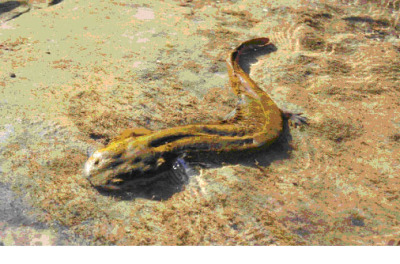Help the Hellbender
By Nate Mullendore
Most forest owners know that stewardship and active management helps improve habitat for a variety of wildlife, ranging from bobcats to songbirds. Some southern Indiana timber managers can add a toothy, two-foot long salamander—the eastern hellbender—to the list of animals that benefit from their efforts.
The hellbender is North America’s largest salamander. They are fully aquatic animals that can live for more than 20 years in the wild. In Indiana, hellbenders were once found in several southern tributaries to the Ohio River, including the lower Wabash River near Vincennes and the Whitewater River in Brookville. Now they are a state-endangered species known to survive only in the Blue River in parts of Harrison, Crawford, and Washington counties.
Hellbenders are most commonly found in cool, fast-flowing streams with limited sedimentation and plenty of large rocks for cover and nesting. The number of sites offering these conditions decreased significantly as the Indiana landscape experienced drastic land conversion and farming intensification over the last two hundred years.
The Indiana Department of Natural Resources is working with Purdue University’s Forestry and Natural Resource Department to better understand how to help this rare animal survive in Indiana. While it is unlikely that hellbenders will return to all parts of their historical range, forest managers throughout the state can utilize a variety of best management practices to protect habitat for all aquatic wildlife species that require good water quality. Erosion control measures in stands near rivers and creeks are especially important for sensitive wildlife like the hellbender.
You can learn more about the hellbender and related conservation efforts at http://www.helpthehellbender.org.
Nate Mullendore is a research associate and outreach coordinator for the Natural Resources Social Science Laboratory at the Department of Forestry and Natural Resources, Purdue University. The lab is directed by Linda Prokopy, Associate Professor of Natural Resources Planning.
